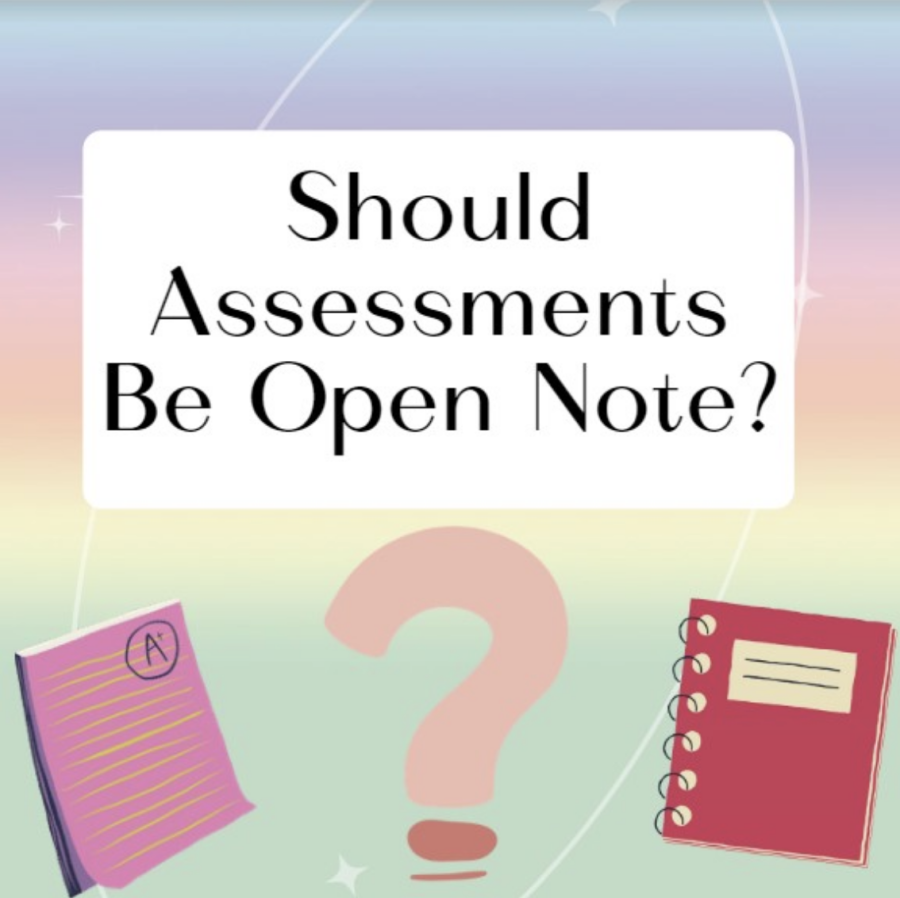SHOULD ASSESSMENTS BE OPEN NOTE?
iUniversity Prep students’ opinions and research on the topic
Introduction
Thanks to access to the internet, everything in life can be considered an open-notes/open book task. Sometimes information slips our minds but thankfully there are many resources online and even other people who are there to be able to help out. So why are school assessments closed book? Could we benefit from open note assignments? Or, as some believe, would open-note assessments hinder our learning?
Why are most assessments closed notes?
There have been many studies and research on what benefits if any, open-book and open-note quizzes serve. According to a study done by researchers Moore and Jensen, open-book exams do not promote long-term learning. Researchers Heijne-Penninga, Kuks, Hofman, and Cohen-Schotanus found that open-book exams do not stimulate a deep learning approach. They also found that closed-book exams allowed the students to engage more deeply with the course material. Another benefit of closed note exams, as found in studies, is that they help students to retain the material. An additional disadvantage to open note exams is that some studies showed that open-book exams may have led to lower scores.
What could be the benefit of open notes on assessments?
Some students advocate for open note exams, but they aren’t alone. Sydney Johnson, a student from Dixie State University, thinks all tests should be open book. She says, “open-note tests motivate students to take more thorough notes while also keeping them organized.” Note-taking is such a vital skill in the learning process and encourages students to engage and participate in class actively. Using notes on exams provides students with the opportunity to learn how to use their resources, which can be an essential skill to have in their future careers. Valerie Strauss with the Washington Post has identified another benefit of open-note exams. She says, “properly constructed, open-book tests can promote the development of higher-order thinking and problem-solving skills over the rote memorization of factual information.” Information is forgotten very quickly, so even if students memorize information for a test they are likely to forget this information shortly after.
iUniversity Prep Students’ Opinions
In a poll of some iUP students, all of the students agreed that at a minimum, certain assessments in certain subjects should be open-note. For example, Yadiz Martinez, a 7th grader and iHoot staff member at iUP, thinks it depends on the subject. She says, “Some classes require more formulas and specific vocabulary, such as math classes. I think that these classes should allow open notes because sometimes it’s really difficult for most students to remember them [formulas and specific vocabulary]. In other cases, like language arts classes, I think that there should not be open notes, because there’s not much vocab[ulary] to remember. It all depends!” Brooke Bolinger, a 10th grader at iUP and iHoot section editor, has a similar opinion, stating that “I feel like we should have open-note for subjects like math or physics for example where we have to memorize a formula. I feel it is better to understand how to use the formula than memorize it. For other classes, I think they should not be open-note, and you should just be using what you know to take tests.” Sometimes it depends on what the course is for, such as if it is a STAAR tested subject or an AP course. Natalie McLaren, iUP junior and iHoot editor-in-chief says, “During AP Exam prep, it’s not smart to do open-note because you’re preparing for a test that won’t let you use any notes. In other cases, though, I think you should be fine because unless you’re preparing for something specific, it doesn’t matter too much.” Alaina, another iUP student, agrees and said, “I don’t think that STARR tests should be open-note, but I think those semester exams and smaller tests should be open-note because someone could easily forget how to solve a problem or forget something they learned in social studies because you just learn so much that it can be hard to remember it all.” Evangeline Smith, an iUP freshman and staff writer for iHoot, thinks that all assessments should be open notes because it encourages people to actually write notes.
Although I would love it if all courses would allow open notes/open books, I would need to look into more research and studies to finalize my opinion. For example, I believe retention is crucial, so if it is certain that open-book exams hinder this, then maybe it would be best to stick with closed-book. Additionally, as someone who always takes notes, it wouldn’t have much effect on me in that aspect. Overall, I need to do more research and weigh the pros and cons of each before making a final decision.
Conclusion
There will always be differentiating opinions on whether exams should be open- or closed-book. Some researchers have concluded that open-note/open book exams have negative effects on students’ learning. Others are major advocates for any and all assessments being open-note/open book. Although we have our own opinions, it is also important to look to the professionals and researchers before we make any changes. What do you think? Should assessments be open-note?
Works Cited
Akresh-Gonzales, Josette. “Open-Book vs. Closed-Book Exams.” NEJM Knowledge+, 25 June 2015, https://knowledgeplus.nejm.org/blog/open-book-vs-closed-book-exams/#:~:text=Closed%2DBook%20Exams%20Actually%20Encourage,took%20an%20open%2Dbook%20exam.
Dartmouth, University of Massachusetts. “Why Take Notes?” Center for Access and Success | Office of Student Affairs | UMass Dartmouth, https://www.umassd.edu/dss/resources/students/classroom-strategies/why-take-notes/#:~:text=Note%20taking%20forces%20you%20to,and%20remember%20the%20information%20later.
Johnson, Sydney. “Opinion: All Tests Should Be Open Book.” Dixie Sun News, 15 Apr. 2021, https://dixiesunnews.com/news/articles/2021/04/15/opinion-all-tests-should-be-open-book/#:~:text=Open%2Dnote%20tests%20motivate%20students,different%20key%20points%20of%20information.
Pelech, James R. “Comparing the Effectiveness of Closed-Notes Quizzes With Open-Notes Quizzes: Blending Constructivist Principles With Action Research to Improve Student Learning.” Digital Commons, https://digitalcommons.nl.edu/cgi/viewcontent.cgi?article=1128&context=ie.
Strauss, Valerie. “Perspective | an Argument for Giving Kids Open-Book Tests during the Pandemic (and after).” The Washington Post, WP Company, 30 Nov. 2020, https://www.washingtonpost.com/education/2020/11/30/an-argument-giving-kids-open-book-tests-during-pandemic-after/.

My name is Makenna Horne and this is my 6th and final year at IUP! This is my 2nd year in iHoot and I’m so happy to be a part of the BOE! I love doing...








Eve Bamber • May 28, 2022 at 2:38 pm
An amazing last article to finish out an amazing school year!! Congrats on everything Makenna, you rocked the Staff Writer scene!!
Makenna Horne • May 28, 2022 at 9:11 pm
Thank you so much Eve! I really appreciate it!